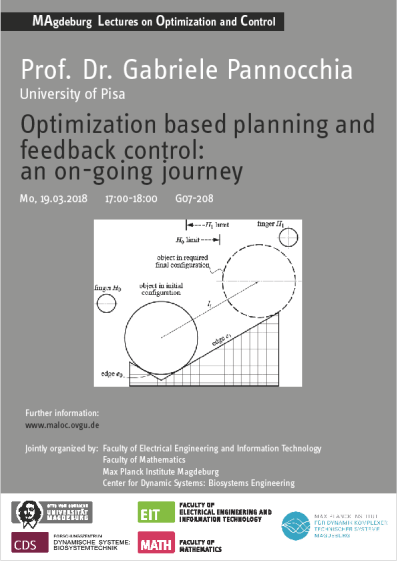Systems and Control Seminar in the Winter Semester 2017/18

Optimization based planning and feedback control: an on-going journey
Speaker
Gabriele Pannocchia
Associate Professor, Department of Civil and Industrial Engineering, University of Pisa, Italy
Time and Place
Abstract
Optimization based strategies for planning and feedback control represent a general framework of numerical methods in which a (often deterministic) model of the system under consideration and its environment are exploited to achieve high-level goals (e.g., minimization of energy consumption, emission of pollutants, maximization of throughput, etc.) as well as more specific tasks (e.g. product quality control, robotic manipulation), while respecting a number of constraints arising from physical, safety or performance limits. In this seminar, I review and analyze the main concepts, successes and ongoing challenges of optimization based methods, with a particular emphasis on how uncertainties can be dealt with effectively and efficiently using disturbance estimation techniques. During the seminar, I present several examples ranging from reaction processes to robotic systems.
Gabriele Pannocchia received the Ph.D. degree in Chemical Engineering from the University of Pisa (Italy) in 2002, where he currently is Associate Professor. He held a Visiting Associate position at the University of Wisconsin - Madison (WI, USA) in 2000/2001 and in 2008. He is author of more than 100 papers in international journals, book chapters and in proceedings of international conferences. Since 2013 he is Senior Editor for the Journal of Process Control, he is the Editorial board of Processes. He is Vice-Chair for Education of the IFAC TC 2.4 (Optimal Control). He was IPC co-chair of the IFAC Symposium DYCOPS 2013 held in Mumbai (India), Area Co-Chair/Associate Editor in IFAC DYCOPS 2016, IFAC World Congress 2017, IFAC NMPC 2018, Control 2018. He has been keynote speaker in several international congresses (IFAC DYCOPS 2010, IFAC NMPC 2015, IFAC DYCOPS 2016). His research interests include: model predictive control systems, process simulation and optimization, numerical optimization, multivariable systems identification and performance monitoring, optimal planning and control for robotic systems.